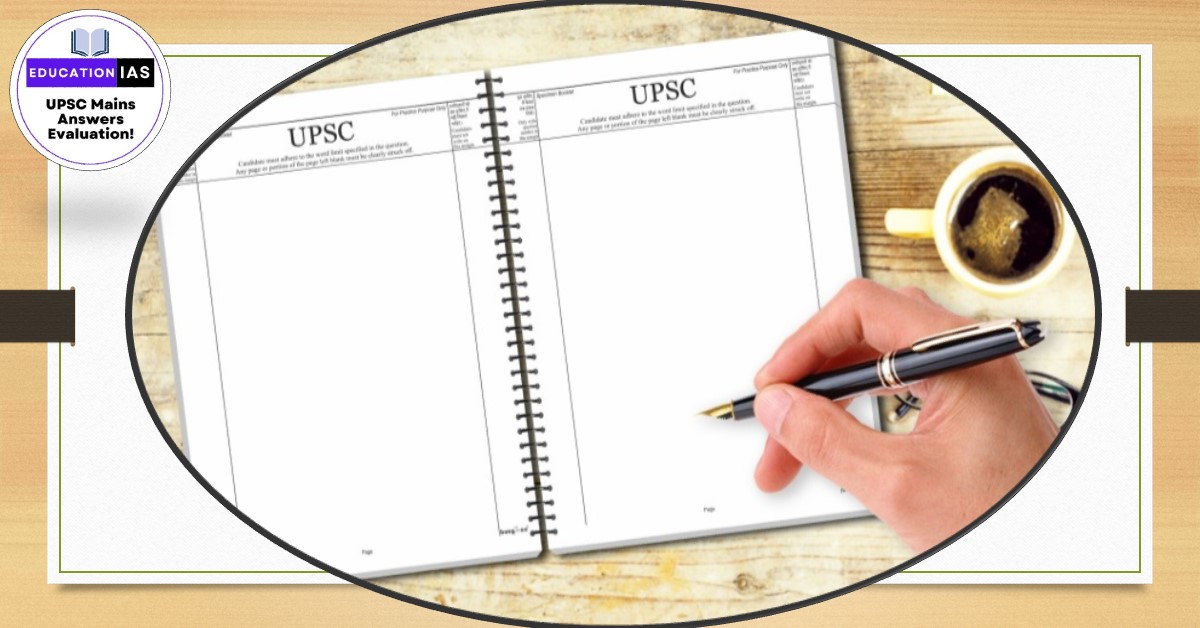Que. Initially Civil Services in India were designed to achieve the goals of neutrality and effectiveness, which seems to be lacking in the present context. Do you agree with the view that drastic reforms are required in Civil Services? Comment.
प्रारंभिक तौर पर भारत में लोक सेवाएँ तटस्थता और प्रभावशीलता के लक्ष्यों को प्राप्त करने के लिए अभिकल्पित की गई थीं, जिनका वर्तमान संदर्भ में अभाव दिखाई देता है। क्या आप इस मत से सहमत हैं कि लोक सेवाओं में कड़े सुधारों की आवश्यकता है? टिप्पणी कीजिए।
Structure of the Answer
(i) Introduction: Introduce the original purpose of the “Indian Civil Services,” its focus on “neutrality” and “effectiveness,” and why reforms are debated today.
(ii) Main Body: Explain how “neutrality” and “effectiveness” have eroded in civil services, and justify why drastic reforms are needed.
(iii) Conclusion: Summarize the need for “drastic reforms” in the civil services to restore their original purpose, ensuring “neutrality,” “effectiveness,” and public trust.
Introduction
The “Indian Civil Services” were initially designed to be neutral and effective in governance, ensuring impartiality and the efficient implementation of policies. However, over time, this ideal has eroded. This raises the question of whether drastic reforms are needed to restore these qualities.
The Decline of Neutrality in Civil Services
(i) Political Interference: One of the primary reasons for the erosion of neutrality is the growing interference of political forces in administrative decisions. Civil servants are often pressured to align their actions with the ruling party’s agenda.
(ii) Partisan Loyalty: Civil servants sometimes exhibit “partisan loyalty” rather than commitment to impartial governance, compromising their role as independent decision-makers. This undermines the ideal of neutrality in public administration.
(iii) Impact on Governance: Political interference leads to biased policies and a failure to address public issues based on merit and public welfare, affecting governance quality.
(iv) Undermining Public Trust: A compromised civil service reduces public trust in government institutions, as citizens begin to view government decisions as politically motivated, rather than being based on fairness and objectivity.
(v) Restoring Neutrality: Drastic reforms are needed to insulate civil servants from political pressures through stronger legal safeguards, clearer codes of conduct, and enhanced oversight mechanisms to restore neutrality in the administration.
The Erosion of Effectiveness in Civil Services
(i) Bureaucratic Inefficiency: Civil services have become increasingly inefficient due to bureaucratic red tape, slow decision-making, and outdated processes. The rigid structure makes responding to emerging challenges difficult.
(ii) Resistance to Change: A culture of resistance to innovation and the use of modern technologies within the civil services hampers the adoption of efficient tools for governance, affecting public service delivery.
(iii) Poor Performance Management: The lack of a robust performance evaluation system results in a failure to hold underperforming civil servants accountable, leading to stagnation and inefficiency.
(iv) Accountability Gaps: The lack of effective accountability structures enables inefficiency and mismanagement of public resources. This harms government projects and delays the delivery of essential services to the people.
(v) Need for Reform: To restore effectiveness, civil services need drastic reforms that focus on streamlining processes, improving performance management, integrating technology, and enhancing accountability mechanisms to ensure greater efficiency in public service delivery.
Institutional and Structural Challenges in Civil Services
(i) Centralized Decision-Making: One major institutional issue is the centralization of decision-making, which limits the autonomy of local administrative units and hampers responsiveness to regional issues.
(ii) Rigid Bureaucratic Structure: The highly hierarchical nature of the civil services makes it difficult for civil servants to be flexible or innovative, restricting their ability to adapt to new challenges effectively.
(iii) Caste and Regional Bias: Caste-based and regional biases still persist in the recruitment and promotion processes within the civil services, compromising fairness and the neutrality of governance.
(iv) Lack of Coordination: There is often poor coordination between departments and ministries, leading to fragmented policy implementation, delays, and duplication of efforts.
(v) Need for Structural Overhaul: Drastic reforms should address the centralization and hierarchical structure, encourage decentralization, improve inter-departmental coordination, and promote a more inclusive and fair recruitment process.
The Public Perception and the Need for Drastic Reforms
(i) Corruption and Mismanagement: A negative public perception of the civil services is shaped by widespread corruption, inefficiency, and mismanagement. These issues erode faith in government institutions.
(ii) Public Disillusionment: When civil servants fail to deliver on promises, or when corruption and nepotism are widespread, citizens lose confidence in democratic institutions and governance.
(iii) Pressure for Accountability: There is an increasing demand from the public for civil servants to be more accountable and transparent in their actions, ensuring that they serve the public interest.
(iv) Institutional Legitimacy: If civil services continue to suffer from corruption, inefficiency, and political interference, they risk losing their legitimacy in the eyes of the people, which weakens democratic governance.
(v) Reform for Public Trust: Drastic reforms are required to restore public trust, including stronger anti-corruption measures, better accountability, transparent recruitment processes, and the professionalization of civil services to ensure they serve the people effectively.
Conclusion
Given the erosion of neutrality and effectiveness within India’s civil services, drastic reforms are essential. Such reforms should focus on improving governance quality, ensuring greater accountability, restoring neutrality, and enhancing the civil services’ efficiency to better serve public needs.
